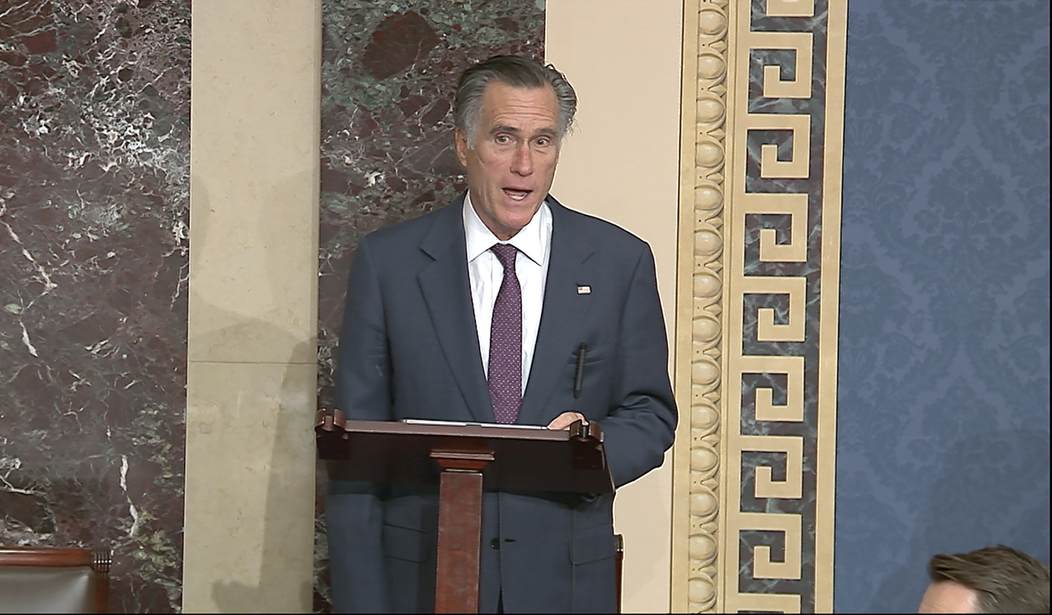It is no secret that Sen. Mitt Romney (R-UT) isn't a fan of former and potentially future President Donald Trump. Now, he's calling on donors to help narrow the playing field so as to stop Trump from earning the nomination through winner-take-all primary contests. On Monday, The Wall Street Journal published his op-ed, "Donors, Don’t Fund a Trump Plurality."
As Romney himself acknowledges, Trump's currently enjoying an "apparent inevitability." RealClearPolitics (RCP) shows him with a spread in the Republican primary of +33.3. But, as Romney goes on to mention, another candidate might have a chance of becoming the nominee "if the field narrows to a two-person race before Mr. Trump has the nomination sewn up." That's going to require learning the lesson not learned in time for 2016 though.
"For that to happen, Republican megadonors and influencers—large and small—are going to have to do something they didn’t do in 2016: get candidates they support to agree to withdraw if and when their paths to the nomination are effectively closed," Romney continues his opening paragraph with, urging that decision to be made by February 26, after the early state contests of Iowa, New Hampshire, Nevada, and South Carolina. Romney even later writes that "[d]onors who are backing someone with a slim chance of winning should seek a commitment from the candidate to drop out and endorse the person with the best chance of defeating Mr. Trump by Feb. 26."
Before Trump ultimately clinched the nomination for 2016, he ran in a crowded primary then too. Among the last to drop out included Sen. Ted Cruz (R-TX) and then Gov. John Kasich (R-OH).
Recommended
Cruz and Kasich tried to team up in April 2016, with Cruz ceding Oregon and New Mexico to Kasich, and Kasich letting Cruz take Indiana, or so he planned to. It didn't work, of course. Neither of those men became the nominee. Trump lambasted the "collusion" off as "desperate," and Kasich even ended up changing his mind about Indiana.
As it turns out, Romney had raised a similar point in February. "I think President Trump is by far the most likely to become our nominee," he said at the Capitol. "If there’s an alternative to that, it would be only realistic if it narrows down to a two-person race at some point."
Romney has already made his thoughts clear about Trump running once more. Last December, he said he would "absolutely not" support Trump, even if he were the nominee. When asked about it, Romney also reminded The Washington Post's Leigh Ann Caldwell about his record on impeaching Trump.
The senator was one of seven Republicans to vote to convict Trump in his second impeachment, with the trial not taking place until he had already left office. Romney also made history when for Trump's first impeachment trial in January of 2020, he became the first senator to vote to convict a president of his own party.
Trump's 2024 election is not the only Republican's race that Romney has refused to help out with. Last November, Sen. Mike Lee (R-UT) won his race against Independent Evan McMullin handily, by over 10 points. Romney refused to endorse the Utah former Republican, though, claiming he was friends with both Lee and McMullin.
.@LACaldwellDC on former President Donald Trump: "Would you support him if he's the nominee?"@SenatorRomney: "Absolutely not...Look, I voted to remove him from office twice...he's simply not a person who aught to have the reigns of the government of the United States." pic.twitter.com/JIfInMSjJH
— CSPAN (@cspan) December 8, 2022

























Join the conversation as a VIP Member